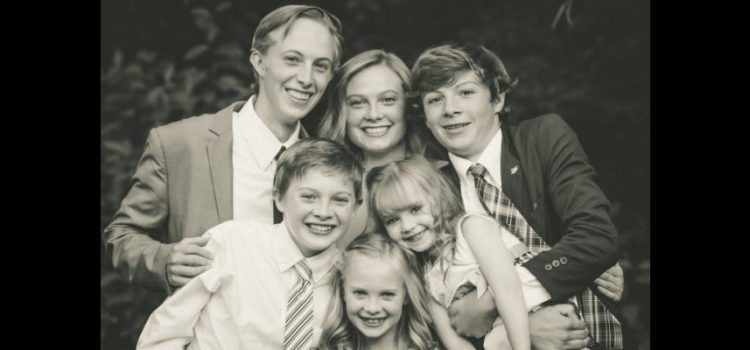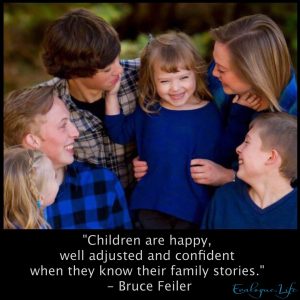

What is the secret to happy families and happy parenting? I interviewed New York Times bestseller Bruce Feiler and his research turned on some great light bulbs about parenting and happy parenting. It’s a surprisingly simple answer: stories.
There are many days of my life where I don’t feel like I know what I’m doing and I’m kind of waiting for someone to show up and clean up the messes I’ve made – literally and figuratively. Case in point: my refrigerator – can someone show up and clean that thing out? But, I digress. So while most days I feel like my life is organized chaos – parenting six kids, working from home, and volunteering on church and school committees – I sometimes get a small tender mercy, a clue that I might be getting one or two things right. One of these tender mercies hit a couple of years ago when I sat at the media dinner for RootsTech 2015. It was my first time attending the media night for the huge family history conference in Salt Lake City. The event is sponsored by FamilySearch.

One of the classic and wonderful parts of the night focused on the importance of storytelling, backed up with data…this spoke to the journalist in me – always loving stories yet seeking proof. We were told about a study (click here to read more about the study) done in the 1990s by a university researcher and then revisited in 2012 by Bruce Feiler about happiness and stability in children.
I want to break down what I learned that day and the next year when Feiler came to RootsTech and got to talk with him about the concept of family stories and happy kids. I had the great joy of interviewing him one-on-one about the “secret sauce” that holds families together. (Click here to read about that full interview.)
Five key secrets to happy families:
1. Family stories = happy, confident kids and helps create happy parenting.

Feiler said children are happy, self-confident, and well-adjusted when they know where they came from, when they know their family stories. At that moment my veracious note taking at the dinner came to a halting stop. WHAT? I DO THIS! WE DO THIS. My husband and I love nothing more than sitting around the dinner table, on a road trip or during family time and talking about our family stories. WHAT? I got something right? Are my kids actually well-adjusted? I leaned back in my chair and started counting up moments when people say to me, “Wow you have great kids. What do you do?” I usually just smile and nod and say, “Well they are good kids in spite of me and their dad.” Which is mostly true, maybe 90 percent. But that other 10 percent – it’s the stories – the family stories. They know that their Grandpa Trotter stole the JB’s Big Boy from the Provo JB’s to impress a girl. They know that their Grandma and Grandpa Jackson worked in a casino in Lake Tahoe and that’s how they met. Grandma Jackson has told them all about it when she teaches them to play 21 at the age of 5…it’s a great counting game, right? They know that Great Grandma and Grandpa Furniss were madly in love and the whole family wants to pattern our marriages after them.
Related: Is family history for kids? Yes!
2. Tell stories about the hard stuff.
The really hard stuff. For many of us, when our kids are down in the dumps, we might have a tendency to focus only on the positive but Feiler suggested we be real with our kids. When our kids face challenges we should share the hard times our family members have endured and how they came out on top. Or maybe they didn’t come out on top. Maybe they are still floundering. Both endings help our children to see the results of bad choices or just bad stuff happening to good people and how they got through it. Feiler called this an “oscillating narrative,” and it’s actually the most helpful kind of family storyline to foster resilience in children.
My husband is really good at telling all the stories. Our courtship was bumpy in some points, and our kids know it.They know the story where I didn’t know if I would be marrying their dad because I wanted religion in my life and I wasn’t sure if he did. I decided to turn it over to God and I was able to have both – the love of my life, and the love of my spiritual life – the gospel of Jesus Christ. That’s a hard story with a good ending. My kids know all about that.
My fourth child loves World War II – he has a passion for learning about it. It seemed like a natural fit for him to really know his Great Grandpa Trotter, and even though he died before he was even born, he knows the hard story of his World War II experience in as much detail as we know.Great Grandpa Trotter was a paratrooper in World War II and that he hid in a foxhole for weeks at a time. They know of the struggles he had because of it and they also know he overcame them and was one of the best people their dad and I ever knew. We loved him so much.
Related: Why Write about the Hard Stuff
3. Find your family’s secret sauce and use it.

What is the “crazy secret sauce?” TALKING! Put your phone down and talk. Some days when I am really tired and need to zone out I am TERRIBLE at this. Feiler told me he felt I had the secret sauce, but to use it a whole lot more. He suggested I be deliberate in my conversations about my ancestors. He told me to take my kids to family cemeteries and talk about those family members. Check. We do that on Memorial Day every year. This past year I did it with a lot more purpose. I felt a large measure of emotion when I told my kids about my own Great Grandma Kap and her trip to America and then to Utah, her love story with my Great Grandpa and her feisty personality. That payoff came to me just a few days ago when my 5-year-old commented about her when we drove by the cemetery while running errands. “Remember when we went there and you told us about that old grandma of yours? I really liked that,” she said in her cutest 5-year-old voice.
Related: Family vacations create great family stories.
4. Tell your beliefs through stories.

5. Don’t just talk to your kids, talk to your parents and grandparents.
If you yourself don’t know the cool stories, and if your parents and grandparents are still alive, ask them! Don’t wait another day. Ask them, record it, write it down, and then turn around and tell your kids all about it. Or better yet, let your kids do the asking. One day I was talking with my kids about my dad. We were talking about how my dad is left-handed. My son then launched into this story about how my dad was a whiz on the baseball diamond because he used both arms to bat and to pitch. How did he know this? He asked my dad what sports he played. Sounds like I should be giving my kids a little more credit, right? Letting them ask the questions yields great results.

In summary, telling stories helps children be more resilient and cope with challenges life sends their way. I bet if you really think about it, you are doing a lot of these things as a parent and if you’re not, they are easy to implement into life and the results are truly life-changing.
If you find Bruce Feiler’s message inspiring, get his book on Amazon (click here). He is a New York Times bestseller for a reason! This article focuses on one of the key findings, but his engaging book contains the best research of our time about happy families and more than 200 ideas. It is must-reading for families making their way in modern times. The Secrets of Happy Families: Improve Your Mornings, Tell Your Family History, Fight Smarter, Go Out and Play, and Much More
In closing I’d also like to specifically challenge you to be intentional about hearing your family stories. An interview is a great place to start. If you record their voice and their stories, I promise you will always be glad you did. Not sure where to begin? Get our free and super easy interviewing tutorial here. The most powerful way you can strengthen your family, might be one of the simplest.
Hey y’all, get Bruce Feiler’s books here!
 Rachel J. Trotter is a writer at Evalogue.Life, where we tell personal and family stories that inspire, and help you tell yours. She has worked as a writer since her college days over 20 years ago. She loves telling people’s stories. She lives in Ogden, Utah and is busy raising six children and loves working on family history alongside her husband, Mat.
Rachel J. Trotter is a writer at Evalogue.Life, where we tell personal and family stories that inspire, and help you tell yours. She has worked as a writer since her college days over 20 years ago. She loves telling people’s stories. She lives in Ogden, Utah and is busy raising six children and loves working on family history alongside her husband, Mat.
Subscribe!

Get our weekly email with tips to tell your story and the Sunday Edition. (Free, of course)


Pingback: The idea of three of my children leaving home in a short time span seemed unlikely when I was changing diapers and wiping noses. But now it's reality. Thank goodness for poignant moments to remind me what's important.
Pingback: How to Teach Your Children to Truly Remember Who They Are | Meridian Magazine
Pingback: Remember who you are. Help your kids put down their phones and remember.
Pingback: Listening to Stories: Your Attitude is the Difference - Tell Your Story with Evalogue.Life
Pingback: Is Family Storytelling and Family History for Kids? Yes! - Tell Your Story with Evalogue.Life
Pingback: Why Stories Matter | Claudia Bretzing
Pingback: I almost died - and what changed after - Evalogue.Life - Tell Your Story
Pingback: Aah, love. Asking relationship questions is a vital part of your story!
Pingback: There are no coincidences - prayer and the uncanny - Evalogue.Life - Tell Your Story
Pingback: Family Stories: Five Things I Want to Do Better | Ali McJoy